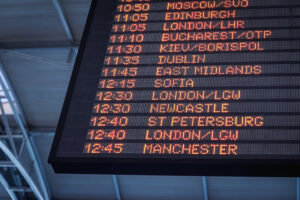We’ve been watching the work-from-home landscape carefully this year and observing the impact of operational shifts on businesses and workers alike. Three colleagues recently shared updates about the future of work-from-home at their companies. Some of them were advised by their employers that remote work, where possible, will continue until the middle of 2021. For some members of the workforce this was welcome news whereas for others it caused some dismay. The very disparity of employees’ reactions underscores a need to look deeper at risk. Our employee travel security experts take a look. [Read more…] about The Future of Work at Home: Employee Travel Security Experts on Risk
As we head into the fall of 2020, what’s changed about the way you travel? If you’re like the majority of travelers whose normal routines have been disrupted this year, one likely area of change will be new health and safety measures as well as the addition of security tools such as employee itinerary monitoring. This recent article from Travel Daily News offered a bit of insight for travelers who plan to hit the road this fall and want to do it safely. [Read more…] about Travel Safety: Learn to Plan Ahead & Use Employee Itinerary Monitoring
When you hear the term “business traveler,” what comes to mind? Those words often evoke images of a crisply-suited executive in an airport, or perhaps a salesperson in business-casual attire in the lobby of a hotel. This year’s pandemic had a sudden, significant impact on business travel overall. With lingering concerns about employee travel security and, as more remote work seems to have taken root, some elements of business travel may remain elective for a time. An area of business travel that has, however, remained essential throughout the pandemic is travel related to supply chain management and the movement of essential goods. [Read more…] about Supply Chain Safety: Ensure Employee Travel Security for your Team on the Road
Borders are re-opening and travel is resuming. How prepared is your organization? The last few months have proven challenging for companies where employee travel was a routine part of business operations. COVID-19 has forced many organizations to re-evaluate and re-define what is “essential.” Business travel (as well as overall employee travel security) is one area that has required additional scrutiny.
This recent article from Business Travel News offers insight into business travel policy, which can help organizations better protect themselves as well as their employees.
 Perhaps most noteworthy in this article is its reference to “duty of care.” If your company is resuming business travel at any level, any travel deemed “essential” should be accompanied by travel policy that focuses on your duty of care. How that is defined will likely differ between organizations, just as the definition of essential travel will vary. Policymakers should consider evaluating organizational travel needs and asking what, if any, additional COVID-specific measures may be necessary to meet their duty of care.
Perhaps most noteworthy in this article is its reference to “duty of care.” If your company is resuming business travel at any level, any travel deemed “essential” should be accompanied by travel policy that focuses on your duty of care. How that is defined will likely differ between organizations, just as the definition of essential travel will vary. Policymakers should consider evaluating organizational travel needs and asking what, if any, additional COVID-specific measures may be necessary to meet their duty of care.
Just as the definition of “essential” may need periodic adjustment, what constitutes “duty of care” may also change. The fluid nature of COVID has required careful monitoring of rising and declining case numbers in various countries, states and territories. As the author points out, there is more at stake presently than simply whether or not a destination is open for travel. Allowing a spectrum of options for employees can help substantially bolster their safety upon resuming business travel. Changes such as allowing direct flights, which may be more costly, to providing an extra layer of travel safety options can all help satisfy a changing duty of care.
Consider how your travel security policies can best support duty of care obligations in the context of current events. Open discussion about additional policy may ultimately lead to no changes, but those discussions may open to the door to general employee travel security enhancements.
IMG GlobalSecur Employee Travel Security Services
IMG GlobalSecur has decades of experience in the security industry. Our team of safety experts stands ready to help you alleviate travel fears with our corporate travel security services including executive travel security expertise and more. In addition, our FoneTrac safety app backed with 24/7 on-call security professionals can assist you in staying safe while away from home or office. Contact us today!
A Human Resources executive recently posed a question about navigating employee travel with lingering concerns about the spread of COVID-19. State by state, country by country, business travel is beginning to resume, although in most places it is limited to travel considered essential. This HR executive was concerned about ways the company could support employees while thinking forward about what kinds of risk and liability could come from required travel. COVID-19 has opened a Pandora’s Box of risks for employee travel security that a great many organizations have not, in the past, explored in-depth.
When is the right time to put employees back on the road or air?
 There are no easy answers as travel resumes, but there are a few things companies should keep in mind. Aside from a general travel safety plan that can accommodate a wide range of employee needs, one of the key elements to successful navigation of this issue is already proving to be flexibility. For example, if remote work is not possible and employees must travel for their jobs, are there options available that might help them feel safer, and are they empowered to make those choices? For example, if they need to engage in domestic travel, are they able to choose whether to fly or drive? This recent article offers some valuable information that can help them make more informed decisions: https://www.npr.org/sections/goatsandsoda/2020/05/30/865340134/coronavirus-faqs-is-it-safer-to-fly-or-drive-is-air-conditioning-a-threat
There are no easy answers as travel resumes, but there are a few things companies should keep in mind. Aside from a general travel safety plan that can accommodate a wide range of employee needs, one of the key elements to successful navigation of this issue is already proving to be flexibility. For example, if remote work is not possible and employees must travel for their jobs, are there options available that might help them feel safer, and are they empowered to make those choices? For example, if they need to engage in domestic travel, are they able to choose whether to fly or drive? This recent article offers some valuable information that can help them make more informed decisions: https://www.npr.org/sections/goatsandsoda/2020/05/30/865340134/coronavirus-faqs-is-it-safer-to-fly-or-drive-is-air-conditioning-a-threat
Is your company able to make reasonable accommodations for employees who may have specific concerns about travel? Mandatory travel for jobs before the pandemic may need to adapt in order to address potential health and safety concerns. An immunocompromised employee, as an example, may not be able to resume business travel alongside other employees who do not share similar health concerns. Or, if they do, what reasonable accommodations may need to be provided? Some companies have strict travel parameters that must be adhered to when travel is booked: lowest fares, lowest cost rental vehicles, preferred hotels, even mandated use of ride share services to save on travel costs. Are policies and parameters able to flex to accommodate various employee health concerns?
All business travel can be accompanied by some risk. Not all risks can be anticipated and mitigated, but when it comes to employee travel safety, preparedness matters. The most important work companies can do right now, before the world re-opens entirely, is re-evaluate their “new normals” for all traveling employees. Because situations can be fluid when business travelers are on the road, it’s important to have options for emergency evacuations, local medical support and simple, rapid communication. As a society, we don’t know what we don’t know yet when it comes to the spread of COVID-19, but what we, the experts, know from experience is that there’s no such thing as too much planning when it comes to employee travel security.
IMG GlobalSecur Employee Travel Security Services
IMG GlobalSecur has decades of experience in the security industry. Our team of safety experts stands ready to help you alleviate travel fears with our corporate travel security services including executive travel security expertise and more. In addition, our FoneTrac safety app backed with 24/7 on-call security professionals can assist you in staying safe while away from home or office. Contact us today!